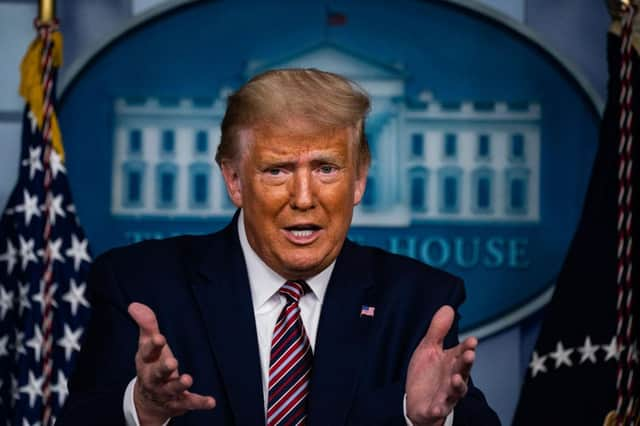Trump tax returns: what New York Times revealed about President Donald Trump’s tax avoidance - and if he broke the law


Donald Trump paid just $750 in federal income tax during his first two years as president, according to a report by the New York Times.
The newspaper claims that tax records extending over two decades show "chronic losses and years of tax avoidance".
Advertisement
Hide AdAdvertisement
Hide AdIt reported that in ten of the previous 15 years, the 45th US president paid no federal tax.
Trump has labelled the findings “fake news”, telling reporters on Sunday: "actually I paid tax. And you'll see that as soon as my tax returns - it's under audit, they've been under audit for a long time.”
The key claims - including $70,000 on hairstyling
The New York Times says that despite being presented as a celebrity businessman and property mogul, Trump’s tax returns "portray a businessman who takes in hundreds of millions of dollars a year yet racks up chronic losses that he aggressively employs to avoid paying taxes".
They dispute a claim previously made by Mr Trump that he made $434.9m in 2018, claiming that he in fact incurred losses of $47.4m.
The most cited claims are that the president paid no tax in ten of the last 15 years and paid just $750 of tax the year he was elected president. A Biden Harris campaign advert claims that the average US nurse pays $10,216 in taxes every year.
The report also claims that many of Trump’s biggest businesses "report losing millions, if not tens of millions, of dollars year after year”.
It says: "that equation is a key element of the alchemy of Mr Trump's finances: using the proceeds of his celebrity to purchase and prop up risky businesses, then wielding their losses to avoid taxes.”
The White House resident is also responsible for $300m of loans according to the report, which will be due for payment in the next four years.
Advertisement
Hide AdAdvertisement
Hide AdThe report outlines that the sitting president made $73m in revenue from overseas during his first two year in office and some of this came "from licensing deals in countries with authoritarian-leaning leaders or thorny geopolitics", including Turkey and the Philippines.
Trump is also said to have claimed business expenses in order to further shrink his tax bill, including $70,000 for hairstyling tied to his work on The Apprentice.
Is tax avoidance illegal?
One of the chief claims levelled at the president is that he avoided paying tax.
But what is tax avoidance and is it illegal?
The IRS describes tax avoidance as “an action taken to lessen tax liability and maximize after-tax income,” in the form of tax credits.
HMRC, meanwhile, describes the use of tax avoidance schemes as “bending the rules of the tax system to gain a tax advantage that Parliament never intended.
“It often involves contrived, artificial transactions that serve little or no purpose other than to produce this advantage. It involves operating within the letter, but not the spirit, of the law.”
The IRS describes tax avoidance as “perfectly legal but the lines between tax avoidance and tax evasion are far from clear, however, meaning it is difficult to discern whether an activity is lawful or not.”
The IRS defines tax evasion as “the failure to pay or a deliberate underpayment of taxes”.
Whether the alleged practices of Mr Trump are lawful or not, many would accuse the president of gaming the tax system and failing to pay his fair share if the records prove to be true.